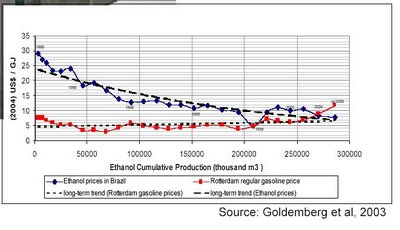Energy and gold among the SliMEs
Clean fuel research deal agreed by BP and Synthetic Genomics
15.jun.07
Biofuel Review
Synthetic Genomics Inc., a privately-held company dedicated to commercializing synthetic genomic processes and naturally occurring processes for alternative energy solutions, has announced a significant, long-term research and development deal with BP.
The deal between BP and Synthetic Genomics is centered on developing biological conversion processes for subsurface hydrocarbons that could lead to cleaner energy production and improved recovery rates. As part of the agreement, BP has also made an equity investment in Synthetic Genomics.
Microbes are key components in sustaining and maintaining life on Earth, and genomics is leading to an enhanced understanding of these organisms. In the first phase of the BP/Synthetic Genomics program, the research will focus on gaining a better understanding of microbial communities in various hydrocarbon formations such as oil, natural gas, coal and shale. Synthetic Genomics, which was founded by genome pioneer J Craig Venter, Ph.D., will use its expertise in environmental DNA sequencing and microbial cell culturing to produce the first comprehensive genomic study of microbial populations living in these environments. Once the basic science research phases are complete, BP and Synthetic Genomics will seek to jointly commercialize the technologies developed.
“We believe that one of the most promising solutions to producing cleaner fuels will be found through genomic-driven advances,” said Dr. Venter. “Through our research collaboration with BP, we will achieve a new and better understanding of the subsurface hydrocarbon bioconversion process which we are confident will yield substantial cleaner energy sources.”
The overall goal of Synthetic Genomics is to discover and/or design new genomes that will code for new types of cells with desired properties for bioenergy or specific chemical production. In this project, Synthetic Genomics scientists hope to better understand hydrocarbon metabolism by sequencing the genomes and culturing the cells of the naturally occurring microbes that thrive in subsurface hydrocarbons.
Tony Meggs, Group Vice President of Technology at BP, adds: “This collaboration is an exciting development that could lead to an unprecedented understanding of the microbial activity in the subsurface; and eventually to the development of more environmentally-friendly and efficient energy production and recovery techniques.”
15.jun.07
Biofuel Review
Synthetic Genomics Inc., a privately-held company dedicated to commercializing synthetic genomic processes and naturally occurring processes for alternative energy solutions, has announced a significant, long-term research and development deal with BP.
The deal between BP and Synthetic Genomics is centered on developing biological conversion processes for subsurface hydrocarbons that could lead to cleaner energy production and improved recovery rates. As part of the agreement, BP has also made an equity investment in Synthetic Genomics.
Microbes are key components in sustaining and maintaining life on Earth, and genomics is leading to an enhanced understanding of these organisms. In the first phase of the BP/Synthetic Genomics program, the research will focus on gaining a better understanding of microbial communities in various hydrocarbon formations such as oil, natural gas, coal and shale. Synthetic Genomics, which was founded by genome pioneer J Craig Venter, Ph.D., will use its expertise in environmental DNA sequencing and microbial cell culturing to produce the first comprehensive genomic study of microbial populations living in these environments. Once the basic science research phases are complete, BP and Synthetic Genomics will seek to jointly commercialize the technologies developed.
“We believe that one of the most promising solutions to producing cleaner fuels will be found through genomic-driven advances,” said Dr. Venter. “Through our research collaboration with BP, we will achieve a new and better understanding of the subsurface hydrocarbon bioconversion process which we are confident will yield substantial cleaner energy sources.”
The overall goal of Synthetic Genomics is to discover and/or design new genomes that will code for new types of cells with desired properties for bioenergy or specific chemical production. In this project, Synthetic Genomics scientists hope to better understand hydrocarbon metabolism by sequencing the genomes and culturing the cells of the naturally occurring microbes that thrive in subsurface hydrocarbons.
Tony Meggs, Group Vice President of Technology at BP, adds: “This collaboration is an exciting development that could lead to an unprecedented understanding of the microbial activity in the subsurface; and eventually to the development of more environmentally-friendly and efficient energy production and recovery techniques.”
Labels: Biofuels, Discovery, environment, Metagenome

